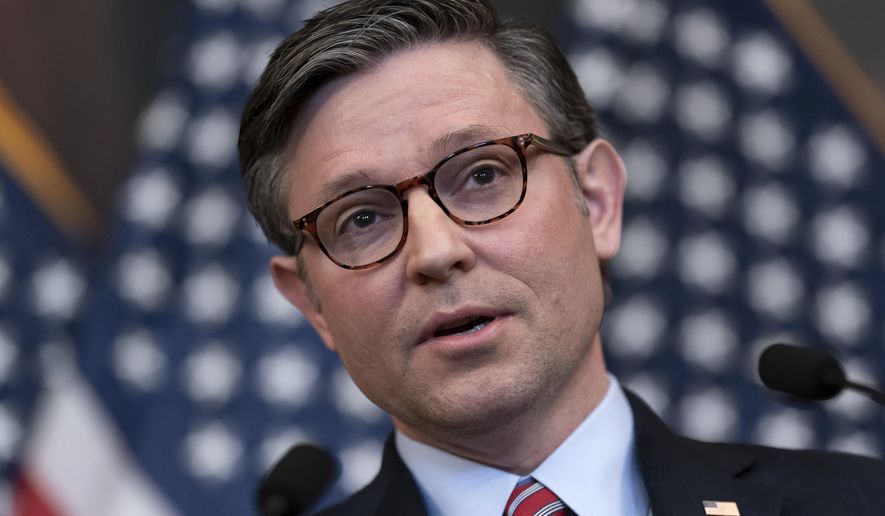House Speaker Mike Johnson put the onus of Congress’ sluggish pace to finish spending work on the Senate, arguing that Democrats in the upper chamber are trying to spend well above what lawmakers agreed to.
Moving spending bills in the House has ground to a halt largely because of infighting, which tripped up attempts to pass Transportation and Justice department funding bills last month. Now the fight has shifted to an overall spending number despite lawmakers agreeing to a funding cap earlier this year.
“We’re awaiting the other team, the other side, the other chamber to come forward with a number that we can agree upon … and that’s the impasse that we’re waiting on,” said Mr. Johnson, Louisiana Republican.
The main point of contention is over the topline spending number of $1.59 trillion, which was a product of the debt ceiling deal negotiated by President Biden and then-Speaker Kevin McCarthy, California Republican.
Mr. Johnson argued that the number was set in stone by the debt ceiling deal.
“The Senate has been projecting and writing well above that, [by] I don’t know, billions of dollars,” Mr. Johnson said. “That’s not what the law says. And so I came in as the new speaker and I said, again, as the rule of law team, we’re going to follow the law. So that’s where the negotiation stands.”
The spending stalemate in Congress comes as a pair of deadlines set by Mr. Johnson to fund the government are fast approaching.
The GOP-led House has passed seven of the dozen bills needed to fund the government, while the Democrat-led Senate has passed only three. Mr. Johnson argued that negotiations could already start between the two chambers on the spending bills that have passed.
Lawmakers must have four spending bills ready for Mr. Biden’s signature by Jan. 19. Two of the bills, one for agriculture and the other for transportation, have not passed the House because of issues within the GOP conference over policy riders.
If the lack of action on spending bills continues, Mr. Johnson will likely face a partial government shutdown scenario. A provision in the debt ceiling deal, which would trigger an automatic 1% across-the-board cut if Congress can’t finish spending work by April, further complicates things.
He could resort to a full-year stopgap bill, but that would not prevent the automatic 1% spending cut. He has promised to not do another short-term stopgap and has threatened to move ahead with the full-year bill if the Senate doesn’t work quickly to agree on an overall spending number.
“We’re awaiting a volley from the other side, should there be one,” Mr. Johnson said.
• Alex Miller can be reached at amiller@washingtontimes.com.




Please read our comment policy before commenting.